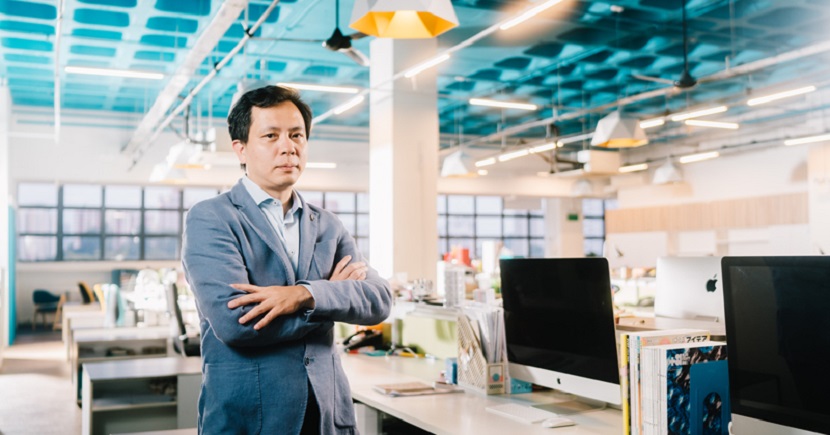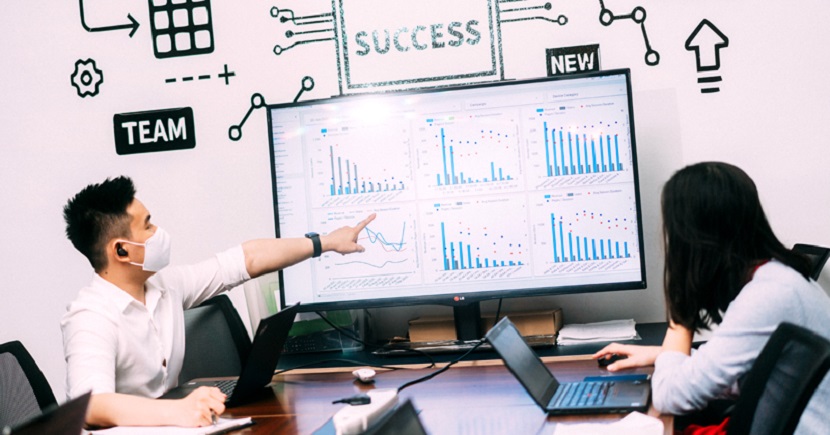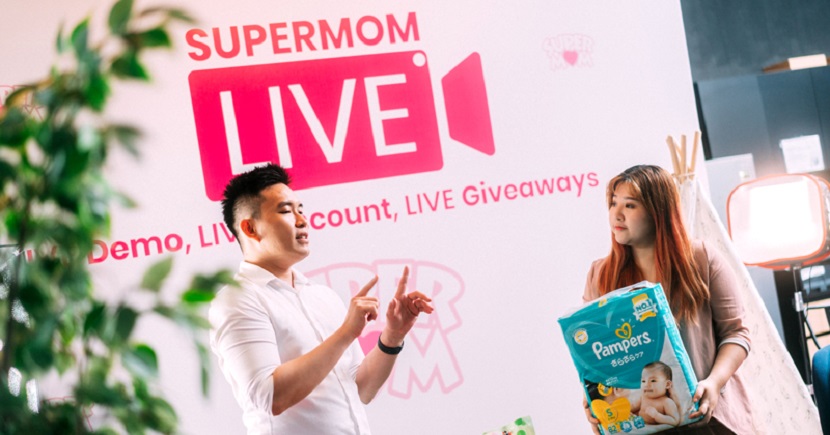First published in The Business Times on 22 September 2020.

The future of branding and communications is going to look quite different, with the bulk of the experience driven by digital interactions and conversations on closed group platforms and key opinion figures.
Not that the brick and mortar model will become extinct. Instead, it will become more of an experiential centre, says Luke Lim, founder and group CEO of branding and communications outfit Louken Group.
"Digital will become the core of the discussion; so being a group of mostly digital services, we will be able to journey with our clients from designing the digital marketing road map, to mapping out their digital strategy and then their entire business model transformation," he says.
"Looking ahead into the new era, Louken will focus on three important pillars: brand strategy, the user design experience, and digital marketing."
Pushing the boundaries
The concept of brand strategy is not new to the group, which started preaching the importance of brand management almost 20 years ago.
Louken was started in 2001 as an agency - then AS Louken - with a focus on brand management and intellectual property. Singapore was significantly behind the West in these areas then, says Mr Lim.
"I was working for the Trade Development Board (which was subsequently restructured to form International Enterprise Singapore and then Enterprise Singapore) in the technology business division 20 years ago. So I travelled with a lot of SMEs to places like the US, Europe and other South-east Asian countries," says Mr Lim. "And I realised there was a gap in branding and IP management."
He adds: "The difference between brand communication and brand strategy is basically strategy and brand positioning.
"But a lot of companies mix up the sequence of events. They think that brand communication is the first thing they need to do. In fact, designing their DNA should be the first thing they do."
Understanding this DNA boils down to research, user thinking, user experience, and even design thinking to craft the brand, says Mr Lim.
Even as the firm was educating companies on the need to build a brand strategy, they were also building up their digital capabilities.
"We were very much a brand agency for fashion brands. So we would do research work for the client, we would do brand audit work, positioning, redesigning and eventually rebranding work. That involves copywriting, design, website design and social media," says Mr Lim.
"But we were doing the digital aspects in a very small way because we were recruiting our own staff very slowly and painfully."
To speed up their entrance into the digital space they decided to embark on a series of mergers and acquisitions (M&As). These include Giraffe Consulting Asia which has expertise in events and social media, digital marketing consultancy Clickr Media, and User Experience Expert (UXE).
Growing the platform
With the benefit of starting their digitalisation efforts early, Louken has managed to leverage some of their products, such as the Welovesupermom platform, a multi-purpose e-commerce management solution created specifically for vendors operating in the maternity, baby, and toddler space.
In addition to its automatic integration with platforms such as Lazada, Shopify, Shopee and Qoo10, it offers vendors single-view data, analysis, and reporting across all their platforms.

Developed by Louken's subsidiary, Giraffe Consulting, with the support of Enterprise Singapore's Enterprise Development Grant (EDG), the platform has experienced 100 per cent growth every quarter during the Covid-19 pandemic and circuit breaker. Today, it is the most visited vertical social marketplace in the parenting segment in Singapore, says Mr Lim.
While dabbling in this space may seem like a journey down an unrelated path, Mr Lim says the platform fits well within their customer ecosystem.
"This is important for us because a lot of our clients are actually interested in this space. In fact, if you look at the young family community, the bulk of spending comes from this group."
As Covid-19 unfolded, Louken focused on expanding and updating the platform as they continuously adapted to the new situation. Some areas of innovation include the development of a new internal dashboard on the Welovesupermom platform that gives better performance visibility.

The team also tried to continuously enhance the platform through AI-automated product recommendations and other technologies that improve the user experience.
"In the case of Welovesupermom, it is very clear - they need the data to serve their brands better. Analytics becomes very important for them because there's a lot of transactional work that happens on the platform on a day-to-day basis. So they need to know precisely what sells, what doesn't sell, and what is trending in the space.
"So we're very thankful that Enterprise Singapore supported us in such initiatives, and that we have done all this work before Covid-19!"
He adds: "Obviously, this is a once-in-a-lifetime crisis, and everyone is suffering from it. But I think without assistance from Enterprise Singapore and without all the transformation that we've invested in over the past five years, we wouldn't be where we are today."
Building the ecosystem
In 2018, Louken decided to establish a corporate incubator for technology startups in the branding and marketing space.
The incubator is one of the partners under Enterprise Singapore's "Startup SG" suite of initiatives, which is aimed at supporting the growth of startups based in Singapore by providing them access to resources, from mentorship to funding, to infrastructure and global connections.
Bringing tech startups into the Louken ecosystem has allowed the group to leverage its strength while also helping them accelerate their own pace of innovation.
On the one hand, they help these startups by providing them with advice on how best to position themselves and offering them access to Louken's clients.
On the other hand, their "vibes" bring an undeniable energy to Louken.
"By bringing them into this environment, firstly, I feel younger. And, it makes our staff feel younger," says Mr Lim with a laugh.
"It definitely increases our pace of innovation. In the tech startup world, they always say nothing is impossible and 'let's try to innovate and use tech to overcome the challenges'. So when we assimilate a tech startup into our environment, our pace of innovation also increases."
Having the incubator inhouse also means they are able to curate the startups that fit into their ecosystem.
"So, for example, one company we have groomed is a company called CombineSell which has been acquired by Shopmatic."
CombineSell allows merchants to manage their business in several online marketplaces through a single platform. Singapore-based Shopmatic acquired the former in 2019, saying then that the acquisition helped fill a gap in their business management solution for sellers. Previously, Shopmatic had to work with third-party providers to connect its proprietary dashboard with online marketplaces. But, even then, all sellers could do was publish listings.
With CombineSell's software, merchants were able to publish listings, answer customer queries, manage customer relationships and more, all from a single platform. "We first worked with the tech startup CombineSell to help them grow through our ecosystem. When it later became part of Shopmatic group, we benefited from the enlarging of our own ecosystem. So now we can help our clients with consulting all the way to onboarding on CombineSell and possibly the Shopmatic platform. The amalgamation of tech solutions has put us on a different level of playing field by giving us a wider range of services to propose to our clients."
Transformational journey
As well-placed as Louken is, they are not one to stand still. During the circuit breaker, the group took the opportunity to continue with its transformation.
As Mr Lim puts it, there are three stages to a company's transformation journey.
Assuming that the brand strategy - understanding the firm's DNA - is in place, the first phase lies in ensuring that the message put across all digital marketing platforms is consistent.
Phase two lies in ensuring all the internal processes are in place - this includes embracing cloud solutions so that staff can work any time and anywhere. The third and final phase lies in transforming the entire business model.
"Some of our subsidiaries and sister companies took advantage of the lull period to take on more workflow digitisation," says Mr Lim.
"These workflow improvement projects include having our project management dashboard in the cloud so that everyone's work processes are mapped out to ensure transparent and clear work loads. So they have full visibility now without having to meet face-to-face."
"We are also developing a brand management portal to allow clients to manage their future design system in the cloud," he says.
In fact, ask the team whether they find it more productive to work at home or in the office and they just might respond that working from home is better; a happy problem for now, but a problem which nonetheless raises a whole host of other problems, says Mr Lim.
"I still believe in meeting physically because I think the camaraderie needed is built through physical meetings. You can't build a team just by working digitally all the time so we will need to find that delicate balance eventually," he says.
Mr Lim himself treads this delicate balance. Despite some self-professed resistance, Mr Lim pushes himself to keep at the cutting edge.
"Being the business owner I have to force myself to take digital courses," he says with an ironic laugh.
"Last year, I put myself through a platform design digital transformation diploma course. And I encourage my employees to also take on those digital programmes because it changes how you look at things," he says.
"I'm very aware that for the company to transform, the top needs to transform our mindset first. Then only can you tell your other staff, who may be more advanced in age, that they can do likewise."
This embracing of digital strategies is unavoidable, says Mr Lim, noting that he is already seeing this trend play out on Welovesupermom. In view of Covid-19 and social distancing requirements, the team has hosted a number of webinars and seminars which, according to Mr Lim, have been very well received with "an unimaginable number of people signing up".
But just how ready are Singapore businesses to take on this style of branding and marketing?
According to Mr Lim, their incubator has accelerated the onboarding of startups in tandem with the increased flow of companies approaching them.
It is also worth noting that the profile of companies Louken services has changed over the years.
"In the first decade of our growth, we serviced a lot of FMCG (fast-moving consumer goods) brands. In the last 10 years, we see a lot more B2B brands; I would say as much as maybe 30-40 per cent of our clients are B2B companies. There are also M2C companies who want to reach out to the consumer directly. Manufacturers are coming directly to us to help them strategise their channels, strategise their branding so that they are able to engage their consumers directly.
He concludes: "Market forces will define what businesses prioritise. Covid-19 is forcing everybody to think faster and transform faster. So this is probably the best time to embrace the whole process."


